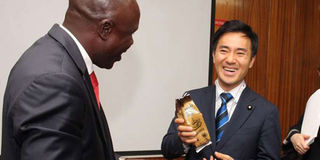Japan and Africa team up to boost agriculture

Willy Bett (left), the Cabinet Secretary for Agriculture, Livestock and Fisheries, with Japan's Parliamentary Vice-Minister of Agriculture, Forestry and Fisheries, Katsuo Yakura at a press conference at Kilimo House in Nairobi on August 26, 2016. PHOTO | NATION MEDIA GROUP
What you need to know:
- Japan and the Food and Agriculture Organization of the United Nations believe that Africa’s agriculture sector should be a catalyst for inclusive growth and improved livelihoods.
Therefore, major effort should focus on making agriculture attractive and profitable for young people.
Boosting agricultural productivity and food security in Africa will require colossal collective efforts by African countries and their partners. Japan already plays a significant role in contributing to sustainable agricultural development on the continent.
Sub-Saharan Africa represents the greatest food security challenge in the world today with the highest prevalence of undernourishment near 25 percent, or almost one in every four people. By 2050, the population in sub-Saharan Africa is expected to exceed two billion, and even if food production grows as projected by about 170 percent, this would still leave some 120 million people undernourished. Clearly, efforts to improve food security and malnutrition need to be stepped up.
Yet, climate change effects, such as higher temperatures and extreme weather events will hamper food production in various regions. Countries acting alone cannot resolve these enormous challenges. Strong collaboration with other nations, international organisations, NGOs, civil society and the private sector will be key to finding sustainable solutions.
For FAO, Japan is an essential ally in promoting rural development and food security and nutrition worldwide. Japan is not only one of FAO’s major resource partners in Africa, it also provides the expertise of skilled Japanese specialists for various agricultural projects in the region.
BUILDING RESILIENCE
Japan is also supporting FAO in building resilience in African countries, where threatening levels of food insecurity result not only from climatic hazards but also from ongoing internal conflicts. Civil unrest must come to an end to achieve food security and improving food security will in turn help build sustainable peace in Africa.
Japan and FAO believe that – with a predominantly young and rural population and over 11 million youth expected to enter labour markets over the next decade – Africa’s agriculture sector should be a catalyst for inclusive growth and improved livelihoods. Therefore, major effort should focus on making agriculture attractive and profitable for young people.
Africa’s future depends very much on the development of its rural areas.
Strengthening the capacities of poor farmers by providing them access to modern technologies and best agricultural practices will enable them to increase their agricultural output and income and contribute to rural economic growth.
In 2013, Japan committed to supporting African countries with $32 billion aimed at increasing agricultural production and productivity, especially for rice, and empowering farmers including through the Coalition for African Rice Development (CARD) initiative. Its aim is to double rice production in sub-Saharan Africa between 2008 and 2018 and disseminate the New Rice for Africa (NERICA) a high-yielding hybrid rice.
Another example of such cooperation is a closely related five-year $2.5 million project aimed at strengthening agricultural statistics in the CARD countries.
Holding the Sixth Tokyo International Conference on African Development (TICAD VI) in Nairobi is strong proof of how determined Japan is to expand its partnership with African countries.
The conference takes place at a very important moment, as 2016 marks the first year of the implementation of the 2030 Agenda for Sustainable Development. TICAD VI provides an opportunity for Asian and African nations, as well as international stakeholders such as FAO, to work together towards Africa’s sustainable development. In addition, the Initiative for Food and Nutrition Security in Africa (IFNA) will be launched during the TICAD VI. IFNA is an ambitious initiative that aims to bring African governments together to swiftly implement food and nutrition security policies and programmes..
José Graziano da Silva is the director-general of the Food and Agriculture Organization of the United Nations.




